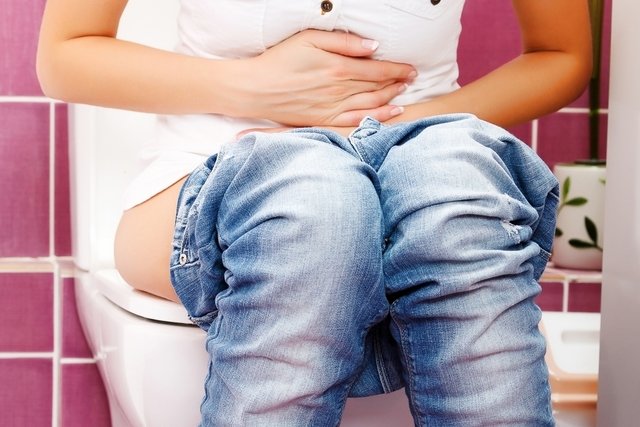Pain when passing stool is usually related to anal abnormalities or conditions, like hemorrhoids or fissures.
It can often be felt with constipation, when stool is hard and dry. Very hardened stool can even cause injuries like small tears when passing through the anus.
If you experience pain when pooping, you should consult your doctor for assessment, especially if the pain persists after defecating, or if it occurs every time you have a bowel movement. The doctor may assess the area and evaluate other symptoms to determine an underlying cause and initiate treatment as necessary.

Causes of pain with bowel movements
The most common causes of pain when pooping include:
1. Hemorrhoids
Hemorrhoids are one of the main causes of pain with bowel movements. In addition to pain, hemorrhoids can cause bleeding, which can be noted with wiping or in the toilet. Hemorrhoids are characterized by a dilated vein that bulges from the skin. These veins can become enlarged due to increased straining with pooping.
Most times, hemorrhoids don’t cause many other symptoms, however some people may report anal itching and overall rectal discomfort. External hemorrhoids can be visualized by a lump or swelling in the area.
Learn more about the most common causes of hemorrhoids.
What to do: You should consult your doctor for assessment and start treatment, which usually involves the use of hemorrhoid ointments. Check out ways to get rid of hemorrhoids with ointments and home remedies.
2. Constipation
People who frequently have constipation will experience more pain with bowel movements, as their stool tends to be harder in consistency. Hardened stool can injure the are upon evacuation, causing small tears. It is common to notice scant amounts of blood on toilet paper after wiping.
What to do: The best way to treat constipation is to ensure a fiber-rich diet, engage in regular exercise and drink at least 2 L of water per day. Severe constipation may require medical interventions, like a laxative or enema, as prescribed by a doctor. Read more about the naturally laxative food you can incorporate into your diet to treat or prevent constipation.
3. Anal fissure
Anal fissures are small wounds that can appear in the rectal area. They occur due to trauma in the area from rough wiping, hard stool, STIs or Crohn’s disease.
Although fissures can cause burning felt at any time, pain is generally more intense when pooping. These wounds are prone to infection, which can cause swelling and even more pain.
What to do: Fissures can heal on their own without medical treatment. However, to decrease risk for infection, adequate genital hygiene is essential. You should cleanse the area with water after each bowel movement. The doctor may also prescribe healing ointments as well as analgesics or laxatives to manage related symptoms. A fiber-rich diet with plenty of water is also advised to prevent hard stools.
4. Anal abscess
An anal abscess is characterized by an accumulation of pus under the skin, close to the anus. This type of abscess generally forms due to a blockage in the anal glands. They are very painful and uncomfortable, but are easily removed with a minor surgical procedure.
Anal abscesses often swell and increase in size over time if left untreated. They can be red in color and can even cause a fever. Symptoms may start off as mild and unnoticeable in the beginning, but they usually worsen over time and interfere with day-to-day activities.
What to do: Surgical intervention is the only treatment for anal abscesses, and they usually involve draining of the pus within the abscess. If you suspect you may have an anal abscess, you should see a doctor for assessment and treatment.
5. Intestinal endometriosis
When pain with bowel movements occurs during menstruation, or if it becomes more intense during periods, it may be a sign of intestinal endometriosis. Endometriosis consists of the growth of uterine lining cells in other parts of the body. During menstruation, all of these uterine cells (whether they are found in the uterus or outside) can become inflamed during menstruation due to hormonal changes. It can cause intense abdominal pain that becomes even worse when pooping.
In addition to pain with bowel movements, women may also report constipation, intense cramping and stool with blood.
What to do: Endometriosis is typically treated with oral birth control pills to regulate hormone levels and decrease inflammation within the intestines. Very intense cases may require surgical removal of affected tissue, however.
When to see the doctor
In most cases, pain with pooping is not an urgent sign. However, you should still see your doctor for assessment, especially if you have other symptoms, like:
- Fever over 38º C (or 100.4ºF)
- Excessive bleeding when pooping
- Intense pain that interferes with sitting or walking
- Anal redness or swelling
Although they are more rare, some types of cancer (like rectal or prostate cancer) can also cause pain when pooping. Therefore, it is important to see your doctor for assessment to rule these conditions out.
